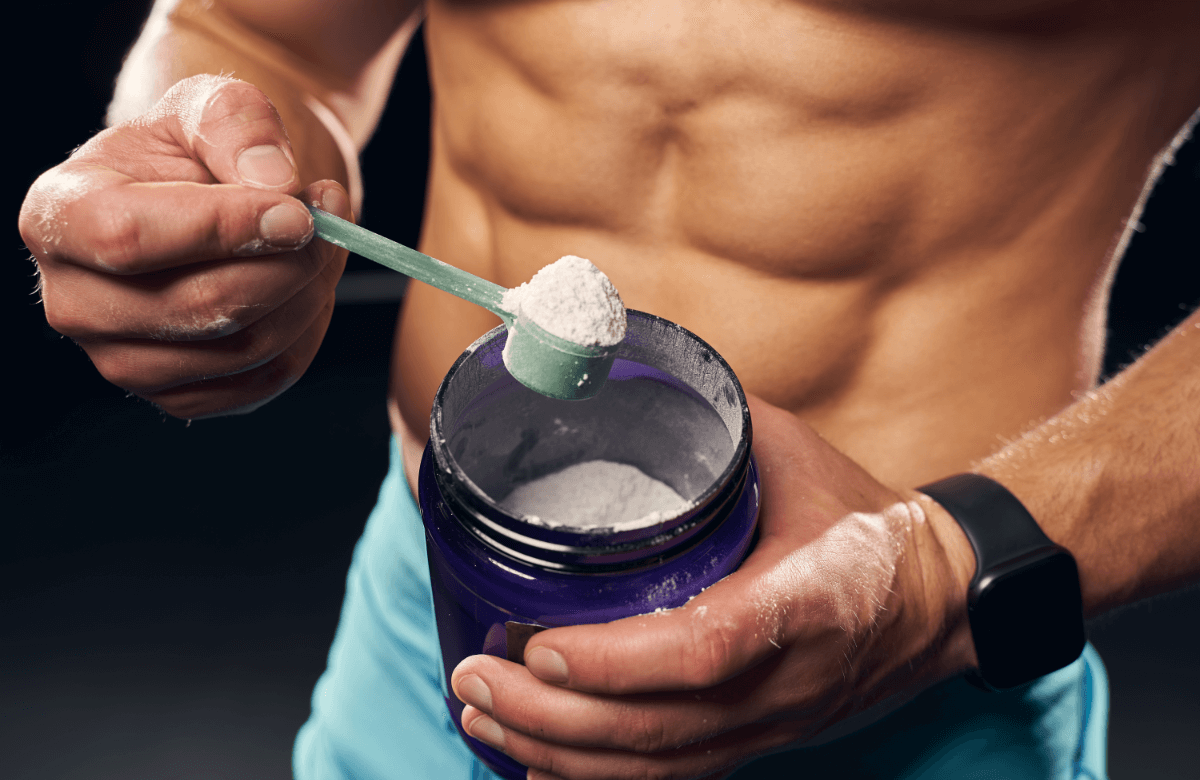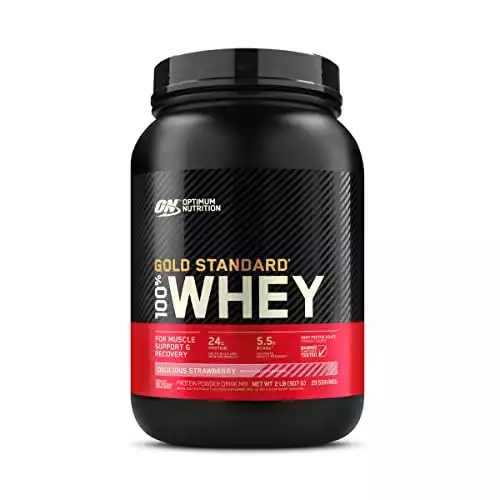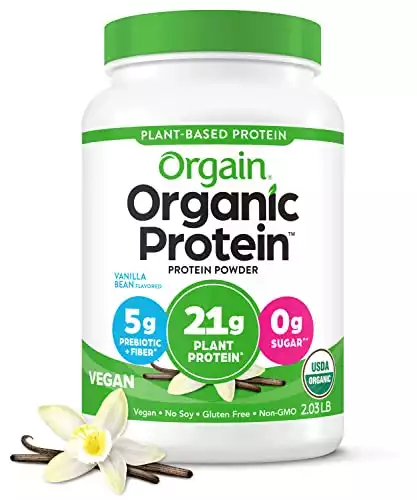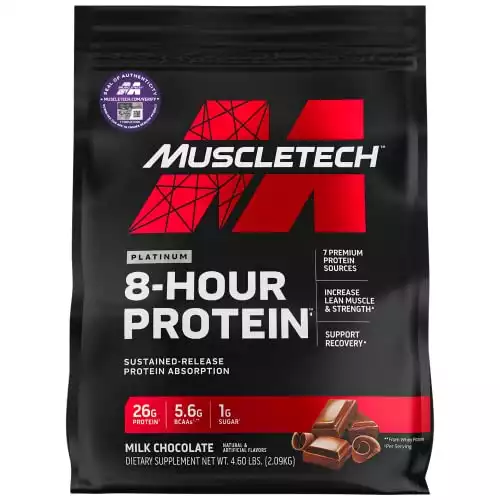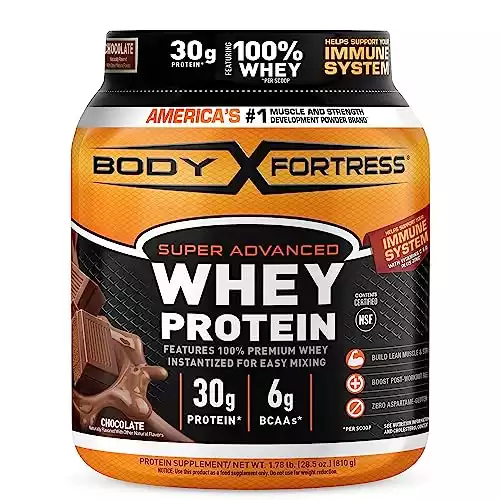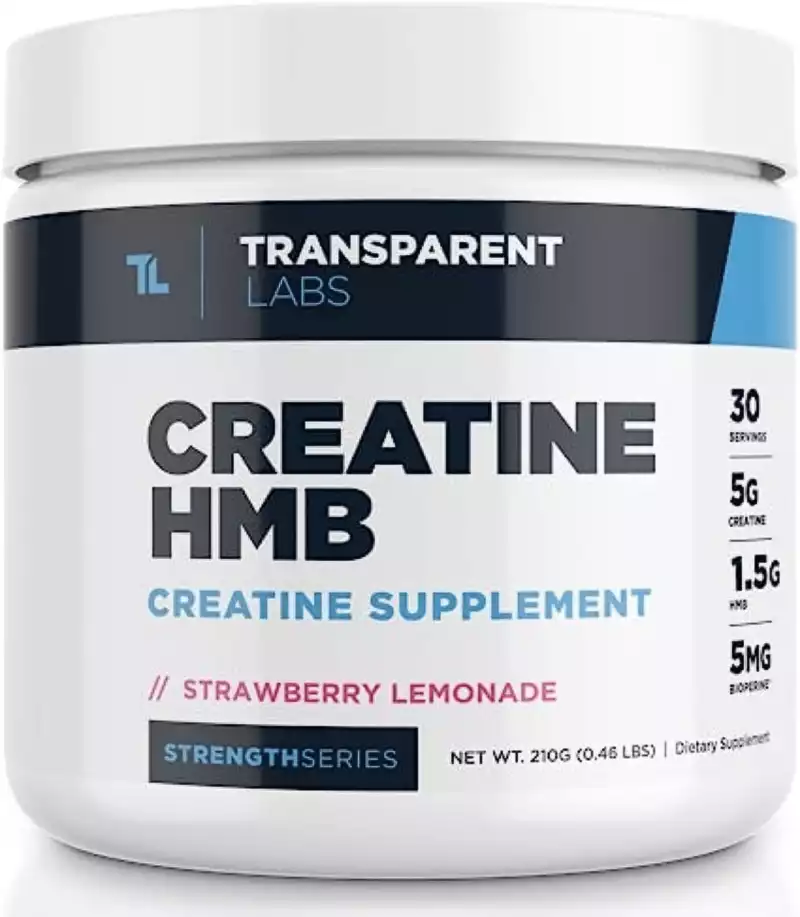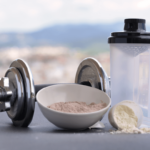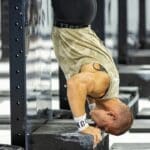Looking for a powerhouse recovery after intense workouts? Discover the five best protein powders that guarantee a quick and efficient muscle recovery.
In the ever-evolving world of fitness and wellness, achieving your goals efficiently and effectively is a constant pursuit. Whether you’re an avid gym-goer, a dedicated athlete, or someone simply looking to lead a healthier lifestyle, optimizing your post-workout recovery is crucial. That’s where the spotlight falls on the indispensable role of recovery protein powders.
These dietary supplements have become synonymous with accelerated recuperation, muscle growth, and overall performance enhancement. Their consumption, whether it occurs before or after a workout, contributes to an overall enhancement in muscle protein synthesis. However, selecting the best recovery protein powder for your specific needs can be a daunting task. With a multitude of brands, formulations, and ingredients flooding the market, finding the perfect fit for your fitness journey requires careful consideration.
Jump to:
In a Hurry ? Here are our top-ranked products
| Product Image | Product Name / Primary Rating / Primary Button |
|---|---|
Why You Should Trust BoxLife?
At BoxLife, we’re your trusted source for fitness and health advice. Our team consists of seasoned experts deeply immersed in the fitness and wellness world, forming the backbone of our guidance. We’re dedicated to providing you with accurate and reliable information, and we ensure that everything we share is up-to-date.
Our community is a mix of fitness enthusiasts and fitness experts actively contributing their knowledge, offering you a comprehensive perspective on various fitness and health topics. With our extensive experience in the industry, we’ve consistently delivered valuable content, earning the trust of countless readers. When it comes to fitness and health, BoxLife is here to be your reliable companion on your journey toward a healthier, more active lifestyle.
Based on our testing, this is the best creatine for most people. It has the perfect dosage of creatine monohydrate per serving, which has been proven to increase muscle mass.
- Promote strength and muscle gains
- Tested for purity and safety
- Creatine has no known side effects
Who Is This Guide For?
This guide is a valuable resource for a diverse audience, catering to individuals with a shared commitment to enhancing their fitness and wellness journey. Whether you’re a fitness novice taking your first steps towards a healthier lifestyle or a seasoned athlete looking to fine-tune your recovery strategy, this guide is here to provide insights and recommendations tailored to your unique needs. It’s a compass for those seeking improved post-workout recovery, accelerated muscle growth, and better overall performance.
How We Picked the Best Products
Our process for selecting the best recovery protein powders was meticulous, ensuring that our recommendations were rooted in genuine experiences and dependable feedback. To achieve this, we adopted a comprehensive approach.
Firstly, we explored online fitness communities like Reddit and Quora. We diligently studied conversations in which individuals openly shared their personal experiences and viewpoints on recovery protein powders. This allowed us to gain valuable insights into the practical performance of different products in real-world scenarios.
Additionally, we conducted extensive research on prominent online marketplaces, including Amazon. These platforms are rich sources of user reviews where people provide candid assessments of products they’ve tried. This wealth of consumer feedback became a crucial resource for our evaluation, enabling us to gauge product effectiveness, safety, and overall user satisfaction.

How We Graded Each Product
Our product evaluation process involves a comprehensive grading system to ensure that we present you with the most reliable and well-rounded recommendations. Here’s how we assessed each product:
- Ingredients and Nutritional Value: We meticulously examined the ingredients list and nutritional profile of each recovery protein powder. This assessment considered the quality and quantity of essential nutrients, ensuring that the products met the necessary nutritional standards for post-workout recovery. We gave higher grades to products that featured minimally processed and all-natural ingredients.
- Effectiveness: To measure the effectiveness of each product, we analyzed real-world user experiences and feedback. We looked at how well the protein powders delivered on their promises, particularly in terms of muscle recovery, growth, and overall workout performance enhancement.
- Safety: The safety of our readers is paramount. We scrutinized product labels and checked for any potential allergens or harmful ingredients. We also considered any reported adverse effects or concerns raised by users.
- Taste and Mixability: Practical aspects like taste and mixability were important factors in our evaluation. We considered user reviews and expert opinions to determine how palatable and easy to incorporate each product was into daily routines while maintaining a balanced diet.
- Price and Value: We assessed the affordability of each product in relation to its quality and effectiveness. We aimed to recommend products that provide excellent value for the price, taking into account serving sizes and the number of servings per container.
- Brand Reputation: We also considered the reputation of the brands behind these products. Brands with a history of quality and customer satisfaction were given higher grades.
- User Reviews: User reviews from reputable sources, as well as feedback from online retailers, played a significant role in our grading process. We paid attention to overall user satisfaction and specific comments regarding product performance.
The Products
Having ventured into the world of recovery protein powders, we’ve thoughtfully handpicked five exceptional products that stand out from the competition when it comes to their effectiveness.
Optimum Nutrition Gold Standard Whey Powder – Our Top Pick
Best suited for individuals who are serious about their fitness goals, including muscle recovery and growth
- High-quality protein
- Great taste and flavor variety
- Digestive friendly
- Pricey
- Some flavors contain artificial sweeteners
Optimum Nutrition’s Gold Standard Whey Powder is a fitness industry standout, renowned for its exceptional nutritional profile. With 24 grams of high-quality whey protein per serving, it’s a mighty tool for muscle recovery and growth. This generous protein content is supported by a rich amino acid profile, including essential branched-chain amino acids (BCAAs), which accelerate muscle repair and reduce post-workout soreness, making it our top pick.
One notable aspect of Gold Standard Whey Powder is its delectable array of flavors. From double-rich chocolate to creamy vanilla, it caters to a wide range of palates. The flavors not only satisfy the taste buds but also dissolve effortlessly, leaving no unappetizing clumps.
All these impressive nutritional benefits come with remarkably low fat, sugar, and carb content, making it an even more attractive choice for health-conscious individuals. Each serving contains just 1.4 grams of fat, a mere 0.7 grams of sugar, and a minimal 1.3 grams of carbohydrates. This means you can enjoy the muscle-boosting benefits of Gold Standard Whey Powder without compromising your dietary goals, whether you’re focusing on muscle gain or maintaining a balanced and healthy lifestyle.
Versatility is another key strength. Beyond the classic shake, this powder can be seamlessly incorporated into various recipes, including protein pancakes, smoothie bowls, and baked goods. It doesn’t overpower other ingredients but complements them, making it a versatile addition to any dietary regimen. Digestive comfort is a priority with this product. Many users report minimal bloating or discomfort, even with regular use. This attribute sets it apart from some other protein supplements that can cause digestive distress.
Optimum Nutrition’s commitment to quality and safety is evident through its third-party lab testing certificates. These certificates ensure that each serving is free from contaminants and meets stringent quality standards. This dedication to transparency and purity underscores the brand’s trustworthiness.
While it’s more expensive than some other options, the price of Optimum Nutrition Gold Standard Whey Powder varies depending on the container size and flavor. Larger containers tend to cost more per serving, but the actual price can fluctuate based on where you make your purchase.
Gold Standard Whey Powder is not just any protein supplement; it’s the best-selling whey protein for a good reason. Its reputation extends far and wide, earning the trust of professional athletes, bodybuilders, and fitness enthusiasts globally. Its consistent delivery of results has solidified its status as a go-to choice for those seeking to optimize their protein intake and achieve their fitness and muscle-building goals.
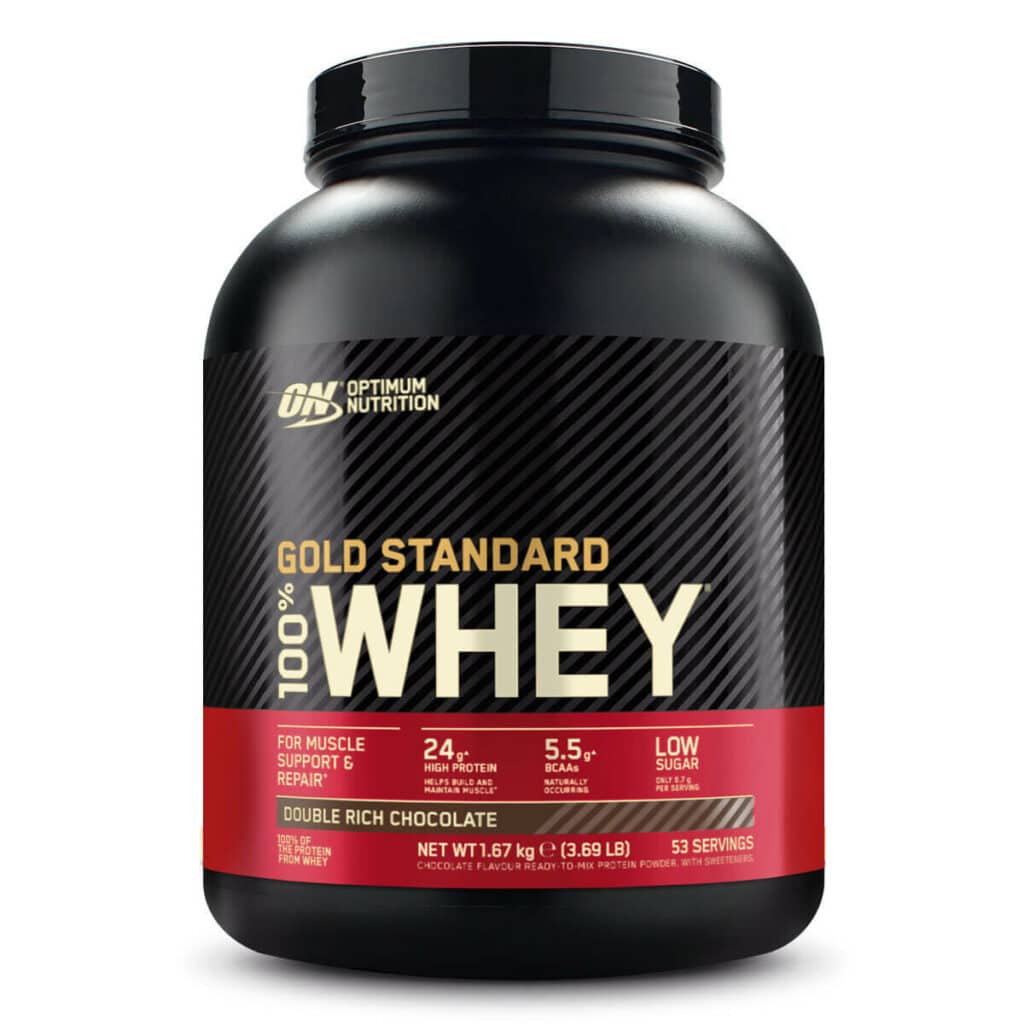
Pros:
- High-quality protein
- Great taste and flavor variety
- Digestive friendly
- Versatile usage
- Low fat, sugar, and carb content
Cons:
- Pricey
- Some flavors contain artificial sweeteners
Key Specs:
| Flavors: | Chocolate, Chocolate Coconut, Chocolate Hazelnut, Chocolate Peanut Butter, Cookies & Cream, Delicious Strawberry, Extreme Milk Chocolate, Strawberries & Cream |
| Calories: | 120 calories per serving |
| Protein Source: | Whey |
| Protein: | 24 grams per serving |
| Price: | $0.95/ounce |
Who It’s Best For:
Optimum Nutrition’s Gold Standard Whey Powder is best suited for individuals who are serious about their fitness goals, including muscle recovery and growth, and seek a high-quality, versatile protein supplement. It’s also an excellent choice for those aiming to maintain a lean and healthy diet due to its low fat, sugar, and carb content.
Dymatize Whey Protein – Best Tasting
An ideal choice for individuals who prioritize both taste and performance
- Numerous flavor options
- Fast absorption
- Great taste
- Might be too sweet for some users
Dymatize Whey Protein has earned a reputation as one of the best-tasting options in the realm of protein supplements, and it’s not difficult to understand why. The appeal of this product begins with its palate-pleasing flavor options. With choices like chocolate, vanilla, and cookies and cream, Dymatize Whey Protein transforms the notion of a post-workout shake into a delightful treat. It strikes a harmonious balance between flavor and sweetness, catering to those who prefer a more subtle sweetness in their shakes.
Based on our testing, this is the best creatine for most people. It has the perfect dosage of creatine monohydrate per serving, which has been proven to increase muscle mass.
- Promote strength and muscle gains
- Tested for purity and safety
- Creatine has no known side effects
Beyond its flavorful taste, Dymatize Whey Protein boasts a rich nutritional profile. Each serving provides an impressive 25 grams of protein, making it an ideal choice for muscle recovery and development. This significant protein content is essential for repairing and building muscles after strenuous workouts, a vital aspect of any fitness regimen. In addition to the protein it also contains 5.5 grams of BCAAs and 4.4 grams of glutamine designed to enhance muscular growth and recovery.
One standout feature of this product is its remarkable mixability. Whether you choose to blend it with water or milk, Dymatize Whey Protein dissolves with ease, requiring minimal effort to achieve a smooth, lump-free consistency. This convenience proves invaluable on busy days when you need a quick and hassle-free protein fix.
While the taste, mixability, and versatility are undeniable strengths, it’s important to consider individual dietary preferences. Some flavors of Dymatize Whey Protein may contain artificial sweeteners or flavors, which might not align with those who seek completely natural ingredients in their supplements.
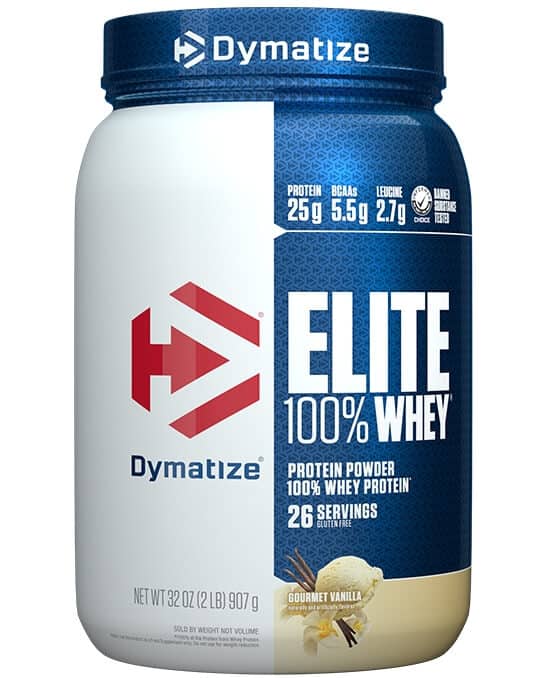
Pros:
- Numerous flavor options
- Fast absorption
- Great taste
- Dissolves smoothly
Cons:
- Might be too sweet for some users
- Some flavors have artificial sweeteners
Key Specs:
| Flavors: | Chocolate, Vanilla, Cookies & Cream |
| Calories: | 120 calories per serving |
| Protein Source: | Whey |
| Protein: | 25 grams per serving |
| Price: | $0.82/ounce |
Who It’s Best For:
Dymatize Whey Protein is an ideal choice for individuals who prioritize both taste and performance in their protein supplements. It’s particularly well-suited for those seeking a flavorful option to support muscle recovery and growth.
MuscleTech Phase8 Whey/Casein Protein Powder – Best Budget-Friendly Option
An excellent choice for individuals on a budget seeking both affordability and taste.
- Extended-release formula
- Contains glutamine
- Affordable
- High sodium
Phase 8 Protein provides your muscles with nourishment for a full eight hours after consumption. It achieves this by combining seven different types of protein in the powder, each releasing amino acids into your bloodstream at different rates. This continuous amino acid supply helps feed and repair your muscles all day long. You can also use Phase 8 as a beneficial nighttime protein shake to ensure a sustained release of amino acids throughout the night.
Phase 8 protein powder is a unique blend of seven different types of protein, including whey protein isolate, hydrolyzed whey protein isolate, whey protein isolate, whey protein concentrate, milk protein concentrate, calcium caseinate, and micellar caseinate. This combination of proteins provides a sustained release of amino acids into the bloodstream, feeding and repairing your muscles for up to eight hours after consumption. While whey protein isolate is considered the best form of protein due to its rapid amino acid breakdown and low lactose and fat content, it is also more expensive. To make the product more affordable, other protein sources are added. However, this blend may contain some lactose, which could be problematic for individuals with lactose intolerance.
Every serving of MuscleTech Phase 8 Protein powder provides you with 4.6 grams of branched-chain amino acids (BCAAs), crucial for muscle growth. BCAAs, including valine, isoleucine, and leucine, play a pivotal role in this process. Notably, leucine is provided in double the quantity compared to valine and isoleucine, which represents the ideal ratio for promoting muscle growth. Each serving of Phase 8 Protein powder contains 2.2 grams of glutamine, which, while slightly lower than an ideal 4-gram quantity, still contributes to post-workout muscle recovery and repair.
MuscleTech Phase 8 offers delightful flavors, including Milk Chocolate and Vanilla. The appealing taste is partly attributed to the relatively high sodium content of 120 mg per serving, which enhances the flavor profile.
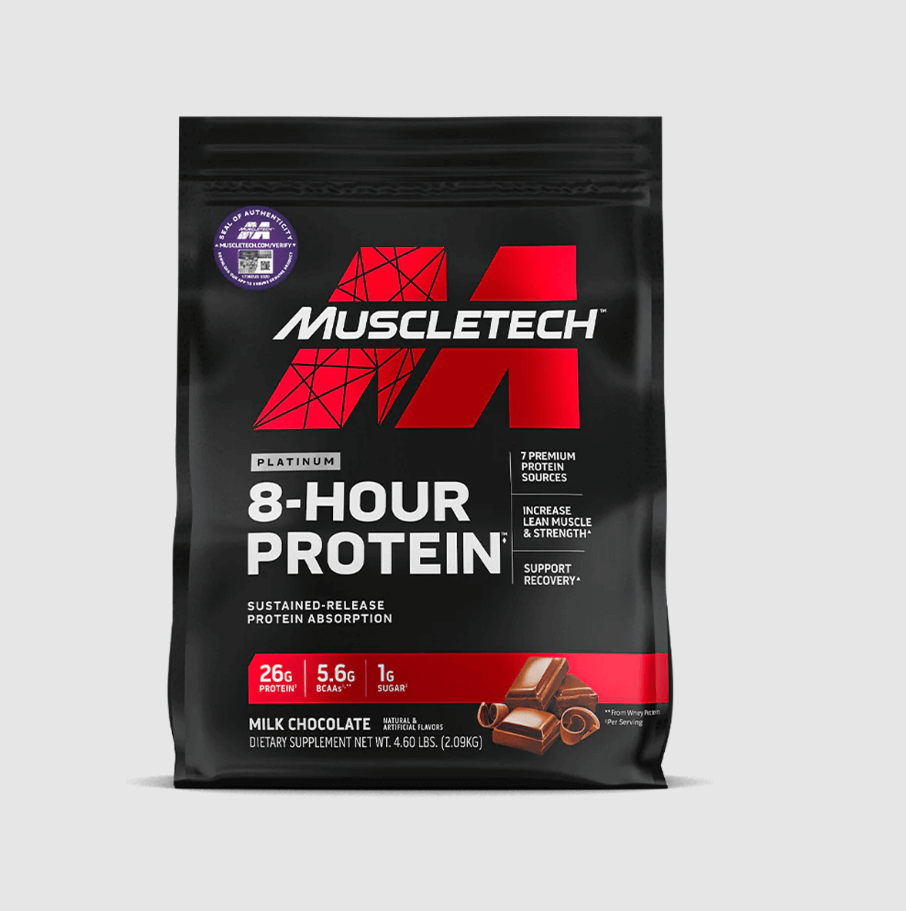
Pros:
- Extended-release formula
- Contains glutamine
- Affordable
- Great taste
Cons:
- High sodium
Key Specs:
| Flavors: | Vanilla, Milk Chocolate |
| Calories: | 180-370 calories per serving |
| Protein Source: | Whey/Casein |
| Protein: | 26 grams per serving |
| Price: | $0.66/ounce |
Who It’s Best For:
MuscleTech Phase 8 Protein is an excellent choice for individuals on a budget seeking both affordability and taste. With its wallet-friendly price and enjoyable taste options, it caters to those looking for a balanced protein supplement that supports their fitness goals without straining their finances.
Orgain Vegan Protein Powder – Best Vegan Option
Incredibly potent supplement for those who want to stay healthy on a more restrictive diet
- Organic and plant-based proteins
- Suitable for anyone with allergies or lactose intolerance
- Hasn't been third-party tested
Orgain is a well-known brand that specializes in producing organic and plant-based nutritional products, including protein powders. Orgain Vegan Protein Powder is designed to cater to individuals who follow a vegan or plant-based diet, as well as those looking for a clean and organic protein source.
Orgain Vegan Protein Powder is a true plant-powered protein source. It derives its protein content from a blend of high-quality plant ingredients, including pea protein, brown rice protein, and chia seeds. This thoughtful combination provides a well-balanced amino acid profile, crucial for muscle growth and recovery. With each serving delivering approximately 21 grams of protein, it competently supports the protein needs of athletes, fitness enthusiasts, and anyone following a vegan or plant-based diet.
Orgain prides itself on using clean and organic ingredients in its products, and the Vegan Protein Powder is no exception. It is crafted with organic ingredients, free from synthetic pesticides and herbicides. This commitment to quality and purity aligns with the values of those seeking clean and environmentally conscious nutrition.
Moreover, Orgain Vegan Protein Powder offers a delightful variety of flavors, including chocolate, vanilla, iced coffee, cookies and cream, strawberries and cream, natural unsweetened, and more. This flavor diversity caters to different taste preferences, ensuring that consumers can enjoy a tasty protein shake or add a burst of flavor to their recipes. What’s more, Orgain Vegan Protein Powder is generally low in added sugars, making it suitable for those striving to maintain a low-sugar diet while still benefiting from protein supplementation.
This recovery powder is free from common allergens such as dairy, soy, and gluten, making it a reliable choice for individuals with food sensitivities or allergies. Additionally, for those who are concerned about genetically modified organisms (GMOs) and animal-derived ingredients, Orgain Vegan Protein Powder has them covered. It proudly carries non-GMO certification and is vegan-certified, ensuring it contains no animal-derived components.
Orgain Protein Powder contains slightly more calories than certain whey protein powders, yet it remains a low-calorie choice. The increased calorie and net carbohydrate content is expected, given that plant-based protein powders, which often feature nut or pea bases, generally contain more calories, fat, and carbohydrates than their whey counterparts. Thanks to its low-calorie profile, this powder proves to be a suitable selection for individuals aiming to either shed weight or build lean muscle.
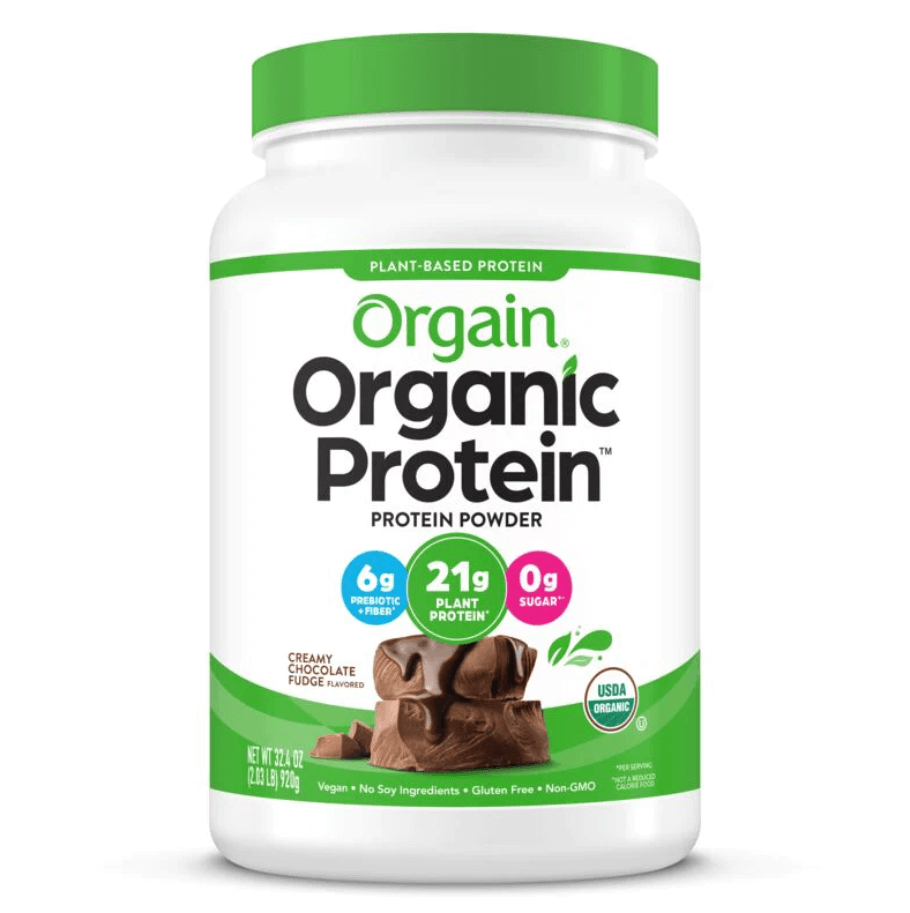
Pros:
- Plant-Powered protein
- Contains organic and clean ingredients
- Low in Added Sugars
- Gluten-free
- Smooth mixing
Cons:
- Low servings of calcium and potassium
- Can clump easily when mixing
Key Specs:
| Flavors: | Vanilla Bean, Iced Coffee, Cookies & Cream, Chocolate Peanut Butter, Chocolate Coconut, Peanut Butter, Chocolate Caramel Sea Salt, Creamy Chocolate Fudge, Strawberries & Cream, Natural Unsweetened |
| Calories: | 150 calories per serving |
| Protein Source: | Pea, Rice, Chia seeds |
| Protein: | 21 grams per serving |
| Price: | $0.88/ounce |
Who It’s Best For:
Orgain Protein Powder is an excellent choice for vegans and vegetarians, offering a plant-based protein source that aligns with their dietary preferences. With its blend of organic plant ingredients, it provides a reliable protein supplement for those following a plant-based lifestyle while meeting their nutritional needs.
Body Fortress Whey – Best for Immune Support
A versatile option suitable for fitness enthusiasts
- High in protein
- Affordable
- Contains artificial sweeteners and additives
- Not organic
Body Fortress Whey Protein Powder is a versatile nutritional supplement known for its exceptional protein content and various benefits that extend beyond just muscle recovery. While it’s primarily sought after for its high protein content, this supplement contains components that contribute to overall health, including immune function.
Body Fortress Whey Protein Powder is a powerhouse of protein, providing approximately 30 grams of protein per serving. This substantial protein content is ideal for individuals seeking to support muscle recovery, repair, and growth, making it a staple for fitness enthusiasts and athletes. This supplement contains a blend of whey protein concentrate and whey protein isolate, combining the benefits of both fast and slow-digesting proteins. This ensures a sustained release of amino acids, which is valuable for muscle protein synthesis and overall recovery.
Whey protein is naturally rich in essential amino acids, including branched-chain amino acids (BCAAs) like leucine, isoleucine, and valine. These amino acids play a crucial role in promoting muscle protein synthesis, reducing muscle soreness, and enhancing overall exercise performance.
In addition to its protein content, Body Fortress Whey Protein Powder often provides essential vitamins and minerals. Many variants are fortified with vitamins like vitamin C and zinc, both of which are well-recognized for their immune-boosting properties. Vitamin C, in particular, is a powerful antioxidant that can help protect cells from oxidative stress and contribute to the body’s immune defense. Because of that, this protein powder can serve as a convenient and versatile immune support option. Its ease of use and ability to blend well with various liquids make it an accessible way to incorporate immune-supportive nutrients into your daily routine.
The product offers a diverse range of flavors, catering to different taste preferences. Popular choices include chocolate, vanilla, and cookies & cream, enhancing the overall enjoyment of protein supplementation.
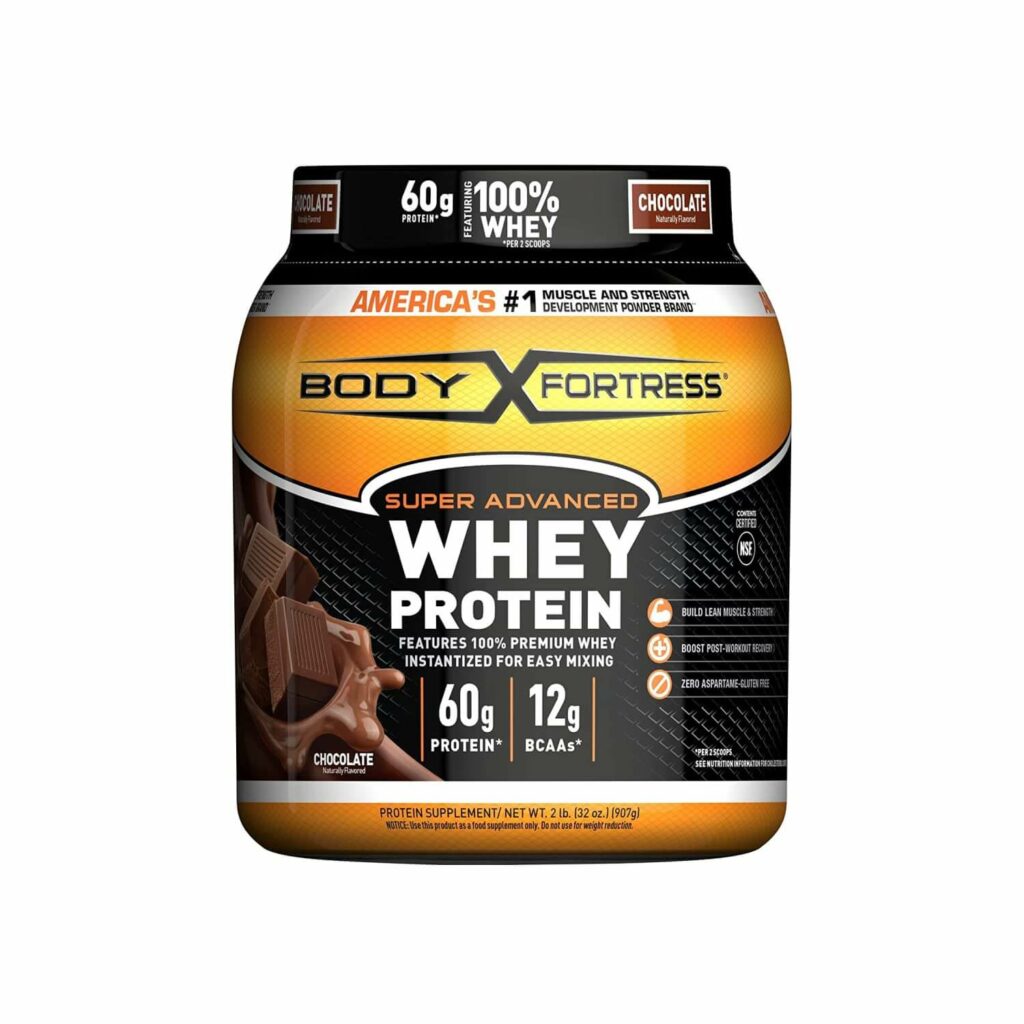
Pros:
- High in protein
- Gluten-free
- Affordable
- Rich amino acid profile
Cons:
- Contains artificial sweeteners and additives
- Not organic
Key Specs:
| Flavors: | Chocolate, Peanut Butter, Cookies N’ Creme, Strawberry, Vanilla |
| Calories: | 140 calories per serving |
| Protein Source: | Whey |
| Protein: | 30 grams per serving |
| Price: | $0.81/ounce |
Who It’s Best For:
Body Fortress Whey Protein Powder is a versatile option suitable for fitness enthusiasts and athletes seeking a high-protein supplement, offering around 30 grams of protein per serving. Additionally, its potential to support immune functions, along with its versatility and affordability, makes it accessible to a wide range of consumers looking to enhance muscle recovery, exercise performance, and overall immune health.
Your In-Depth Guide to Choosing the Right Recovery Protein Powder
Recovery protein powder is a popular dietary supplement used by athletes, fitness enthusiasts, and individuals looking to support their post-workout recovery. It can help repair and rebuild muscle tissue, reduce muscle soreness, and replenish energy stores. Here are the top factors to consider when buying.
Protein Source
The source of protein in your recovery powder is crucial. Different protein sources offer distinct advantages and may be more suitable for your specific needs.
Whey Protein
Whey protein is derived from milk and is one of the most popular options. It is a fast-digesting protein, making it ideal for post-workout recovery as it quickly delivers amino acids to your muscles. Whey protein is rich in essential amino acids, particularly leucine, which plays a critical role in muscle protein synthesis.
Casein Protein
Casein protein is another milk-derived protein, but it digests more slowly than whey. This makes it a good choice for a nighttime recovery option, as it provides a steady release of amino acids throughout the night, supporting muscle repair and growth during sleep.
Plant-Based Proteins
For people with dairy allergies or those following a vegan or plant-based diet, plant-based protein powders such as peas, rice, hemp, and soy can be excellent alternatives. These proteins may digest more slowly than whey but can still be effective for recovery.
Collagen Protein
Collagen protein is a unique option that focuses on joint and skin health in addition to muscle recovery. It contains specific amino acids like glycine, proline, and hydroxyproline, which support connective tissue repair and skin elasticity.
Protein Content
The protein content per serving is a critical factor in determining the effectiveness of a recovery protein powder. Look for products that provide at least 15-20 grams of protein per serving, especially if you’re using it as a post-workout supplement. Higher protein content can promote better muscle recovery and growth.
Amino Acid Profile
Amino acids are the building blocks of protein, and they play a vital role in muscle repair and recovery. Check the amino acid profile of the protein powder you’re considering. Look for products that have a balanced blend of essential amino acids, including branched-chain amino acids (BCAAs) like leucine, isoleucine, and valine. BCAAs are particularly important for muscle protein synthesis.
Carbohydrate Content
Some recovery protein powders come with added carbohydrates, which can be beneficial for replenishing glycogen stores after intense workouts. If your primary goal is muscle recovery and growth, opt for products with a moderate carbohydrate content. However, if you’re trying to control your overall carbohydrate intake, choose a product with fewer carbohydrates or none at all.
Fat Content
Most recovery protein powders are low in fat, but it’s still worth checking the label. Some fats, such as omega-3 fatty acids, can have anti-inflammatory properties that aid in recovery. However, the fat content in most protein powders is minimal and shouldn’t be a major consideration.
Added Ingredients
Recovery protein powders often contain additional ingredients to enhance their effectiveness. Some common additives include:
- Branched-Chain Amino Acids (BCAAs): These amino acids, especially leucine, can help stimulate muscle protein synthesis. Look for powders that contain added BCAAs.
- Glutamine: Glutamine is an amino acid that may help reduce muscle soreness and improve recovery. Some products include it as an added ingredient.
- Creatine: Creatine is known for its performance-enhancing and muscle-building properties. If you’re looking for an all-in-one recovery and muscle-building solution, consider a product with added creatine.
- Electrolytes: If you engage in intense workouts and sweat heavily, a recovery powder with added electrolytes (sodium, potassium, magnesium) can help replenish what you lose through sweat.
- Vitamins and Minerals: Some recovery powders include vitamins and minerals like vitamin D, calcium, and magnesium, which can support overall health and recovery.
FAQs:
Which protein is best for recovery?
Whey protein is considered one of the best options for recovery. It contains a rich profile of essential amino acids, including high levels of leucine, which supports muscle repair and growth. Whey protein is rapidly absorbed, making it ideal for post-workout recovery as it delivers amino acids quickly to your muscles. However, the choice of protein may depend on individual dietary preferences and restrictions.
When should I eat protein for recovery?
Consuming protein for recovery is most effective within 30 minutes to 2 hours post-exercise. This window, often referred to as the “anabolic window,” is when your muscles are most receptive to protein and nutrient absorption. Consuming protein during this period can aid in muscle repair and growth. However, the overall daily protein intake and consistency in your diet are also crucial factors for recovery, not just the timing.
What helps muscles recover faster?
Several factors can facilitate faster muscle recovery and these include proper nutrition, emphasizing protein intake, and staying well-hydrated. Adequate sleep and rest are essential, as is incorporating gentle stretching and appropriate warm-up and cool-down routines into your exercise regimen. In addition, post-exercise strategies like ice baths, heat therapy, and massages can also reduce muscle inflammation and enhance recovery.



